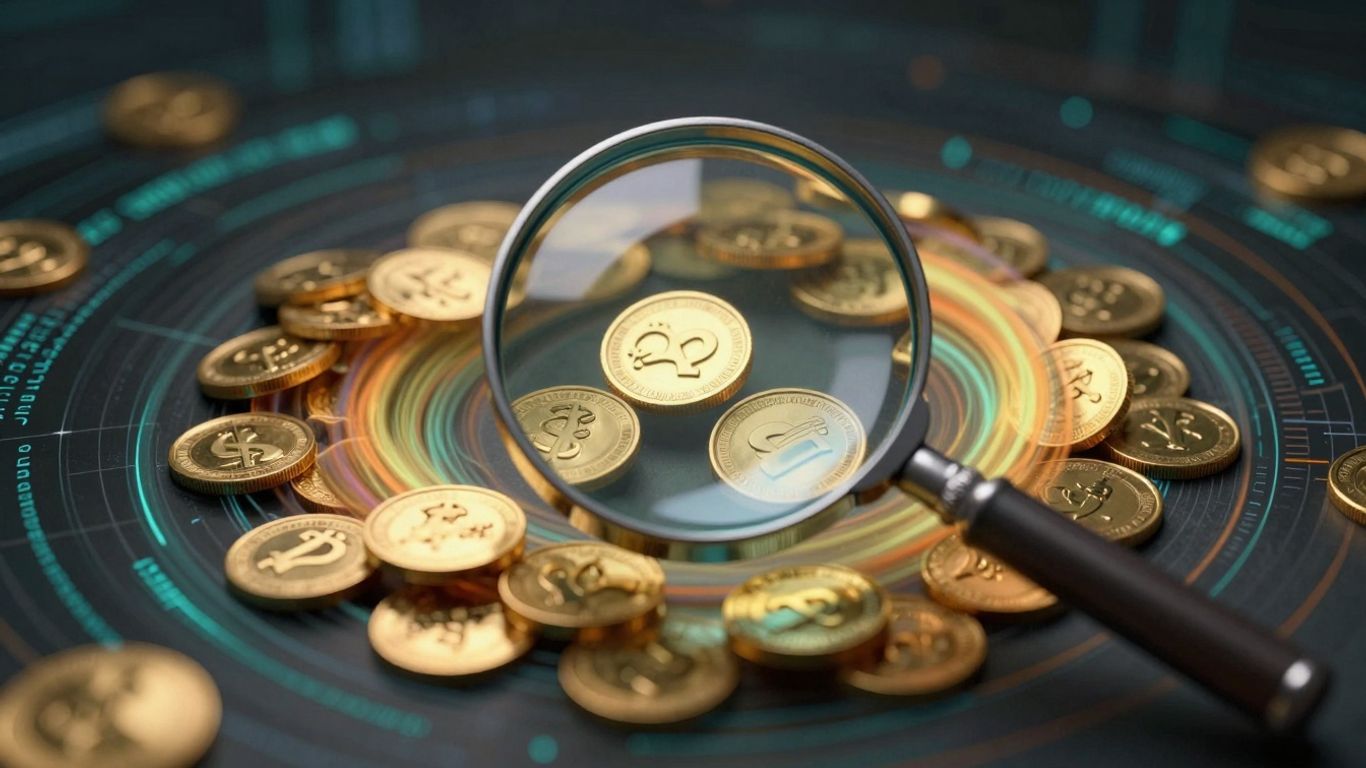[ newsletter ]
Stay ahead of Web3 threats—subscribe to our newsletter for the latest in blockchain security insights and updates.
Thank you! Your submission has been received!
Oops! Something went wrong. Please try again.
Learn how to track a wallet with essential tips and tools. Monitor transactions, balances, and trace funds across the blockchain for security and compliance.





So, you've got some digital money, huh? Maybe it's Bitcoin, maybe something else. Either way, you probably want to know what's going on with it. It's not like your regular bank account where you can just log in and see everything easily. Keeping track of your crypto wallet activity is pretty important, whether you're just starting out or you've been around the block a few times. This guide will walk you through how to track a wallet, using simple terms and showing you the tools that can help.
Think of your cryptocurrency wallet like a digital passport for your assets. Every time you send or receive digital currency, it leaves a trace on the blockchain. This trace is your digital footprint, and understanding it is pretty important if you're serious about managing your digital money. It’s not just about the money; it’s about the system itself.
Your wallet's activity is basically the record of all your financial dealings in the crypto world. It shows where your funds came from, where they went, and how much was involved. This history is public on the blockchain, which is kind of wild when you think about it. It means anyone can look up a wallet address and see its transaction history. This transparency is a double-edged sword; it helps with accountability but also means your financial movements aren't exactly private.
Here’s a quick breakdown of what you might see in your transaction history:
Understanding these details helps you piece together the story of your digital assets. It’s not just a list of numbers; it’s a record of value transfer. For example, if you're trying to track funds, you might use a tool to follow the movement of crypto between addresses on the public ledger. This kind of crypto tracing is becoming more common for things like anti-money laundering efforts. While the blockchain is pseudonymous, not completely anonymous, the transaction history can reveal a lot about activity.
The pseudonymous nature of blockchain doesn't mean it's completely anonymous. While you might not see a person's name attached to a wallet address, the transaction history can reveal a lot.
So, why bother keeping tabs on this stuff? Well, for starters, it's about security. You want to know if any unexpected transactions pop up, right? It also helps you keep track of your investments, understand your spending habits, and make sure you haven't accidentally sent money to the wrong place. Plus, when tax season rolls around, having a clear record of your transactions is a lifesaver. It’s also useful for spotting potential scams or unauthorized access to your accounts. Keeping an eye on your wallet activity is just good financial hygiene in the digital age. You can explore the traceability of cryptocurrency transactions to get a better grasp on your crypto footprint digital identity.
Keeping an eye on your wallet is super important! It helps you see where your digital money is going and coming from. This is great for making sure your money is safe, understanding your spending, and it's also a must for when tax time rolls around. Plus, if anything weird happens, you have a record.
So, you've got your digital assets sitting in a wallet, and you want to keep an eye on things. It’s not as complicated as it sounds, really. There are some pretty neat tools out there that make tracking your crypto activity straightforward. Think of them as your personal digital accountants, but way cooler.
Block explorers are your first stop for seeing what's happening on the blockchain. They're basically websites that let you look up any wallet address and see all the transactions associated with it. It’s like a public record book for crypto.
Some popular ones include Blockchain.com for Bitcoin and Etherscan.io for Ethereum. Just pop the wallet address into the search bar, and you'll get a list of all its activity. It’s important to remember that while you can see the flow of funds, you usually can't see who owns the wallet unless they’ve publicly linked it to their identity. It’s all pseudonymous, remember?
While block explorers show you raw data, dedicated wallet trackers offer a more user-friendly dashboard. These tools often connect to your wallets (or let you manually input addresses) to give you a clear overview of your holdings and recent activity.
These apps can make managing your crypto much simpler, especially if you have assets spread across multiple wallets or exchanges.
For those heavily invested in Bitcoin, specialized Bitcoin wallet trackers can offer an extra edge. They often have more granular data specific to Bitcoin’s unique structure and can be particularly useful for deep dives into Bitcoin transaction history.
These specialized tools are built with Bitcoin's specific blockchain architecture in mind, potentially offering more detailed insights or features not found in general crypto trackers. They can be invaluable for serious Bitcoin investors or those needing to meticulously track BTC movements for specific purposes.
So, you want to keep a closer eye on your digital money, huh? It’s not as complicated as it might sound. Think of it like checking your bank statement, but for your crypto. We’ll walk through the basic steps to get you tracking your wallet activity.
First things first, you need the actual address of the wallet you want to track. This is like the account number for your crypto. It’s a string of letters and numbers that looks a bit random, but it’s unique to that specific wallet. You can usually find this in your wallet’s settings or by looking at a past transaction you sent or received. This address is your key to accessing all the public information about that wallet’s activity.
Once you have the wallet address, you’ll want to use a block explorer. These are websites that let you see everything happening on a specific blockchain. Think of them as public ledgers. You just pop the wallet address into the search bar on a site like Blockchain.com for Bitcoin or Etherscan.io for Ethereum. What you’ll see is a list of all the transactions going in and out of that wallet. You can check amounts, times, and even the fees paid. It’s pretty straightforward.
Here’s a quick look at what you might see:
These explorers are your first stop for verifying any transaction. They’re free and give you a raw, unfiltered look at what’s happening on the blockchain. It’s important to remember that while you can see the flow of funds, you usually can't see who is behind the address. For those looking to understand more about tracking 'smart money', there are specific approaches to consider [693a].
For more in-depth tracking, especially if you're managing multiple assets or want a historical overview, dedicated crypto wallet trackers come into play. Tools like CoinTracking or Delta can aggregate your activity across different wallets and exchanges. They help you keep an eye on your overall balance and spot any recent movements that might catch your eye. This is particularly useful for getting a clear picture of your entire digital asset portfolio over time.
While block explorers show raw transaction data, wallet trackers often provide a more user-friendly interface for analyzing your financial history and making sense of your crypto journey.
So, you've got a wallet address and you've looked at its basic activity. Now, what if the money didn't just sit there? What if it moved on? That's where tracing funds gets interesting. It's like following a breadcrumb trail, but instead of breadcrumbs, you've got transaction hashes and wallet addresses.
Sometimes, crypto doesn't go straight from point A to point B. It might hop through a few other wallets first. These are like pit stops or transfer points. You'll see a wallet receive a bunch of crypto, and then almost immediately send it out to several different addresses. This can happen for a lot of reasons, like breaking down a large sum into smaller ones, or sometimes, it's a way to make tracking harder. When you spot these kinds of wallets, they're key to following the money trail further. They act as hubs, and understanding their role can reveal more about the overall flow.
Big transactions definitely stand out. If you see a huge amount of crypto move from a wallet associated with a known exchange, or from a wallet that's known to hold a lot of coins, it's worth paying attention to. Where does that big chunk go? Does it get split up? Does it go to another large wallet? Following these significant flows can give you clues about major players or trends in the market. It’s like spotting a large truck on the highway – you know it’s carrying something important.
This is where it gets a bit like detective work. You're not just looking at one transaction, but trying to see if there's a story being told over time. Are certain wallets always sending funds to each other? Does a specific group of wallets seem to be working together, receiving and sending crypto in a predictable way? Spotting these recurring connections can help you understand if there's a particular operation, a group of people, or even a specific service that's using these wallets. It's about connecting the dots.
Following the path of digital assets across the blockchain is like piecing together a puzzle. Each transaction is a clue, and by looking at how they connect, especially with larger movements or repeated activity between addresses, you can start to build a clearer picture of fund flows and potential activities beyond your immediate view. For detailed analysis, tools like Blockchain.com can be incredibly helpful in visualizing these complex movements.
The public nature of the blockchain means that while wallet addresses aren't directly tied to your name, the transaction history can tell a story. Tracking someone else's wallet without them knowing or agreeing can feel like a serious invasion of privacy. It's really about using these tools with a sense of responsibility.
Here’s a quick look at what to watch for:
By paying attention to these elements, you can start to piece together a more complete picture of where funds are going and who might be involved.

So, you've got the tools and you know how to look at what's happening with your crypto wallets. That's great! But how do you actually make this useful for, you know, real life? It's not just about looking at numbers; it's about using that information to your advantage.
Look, taxes are a pain, but ignoring them with crypto is a recipe for disaster. Keeping good records of every buy, sell, and trade is super important. If you're using a wallet tracker, it can automatically log these for you. This means when tax season rolls around, you're not scrambling to remember every single transaction from the past year. You can just pull a report. It makes life so much easier and keeps you out of trouble with the tax folks.
Here’s what good record-keeping looks like:
Keeping track of your wallet activity helps build a clear audit trail. This isn't just for taxes; it's good practice for any financial activity.
Sometimes, things go wrong. Maybe you're involved in a disagreement over a transaction, or perhaps there's a more serious situation where you need to prove the movement of funds. Having a detailed history of your wallet's activity can be incredibly helpful here. It provides concrete evidence of when assets moved, where they went, and in what amounts. This kind of data can be the difference-maker when trying to resolve disputes or provide clarity in legal matters. It's like having a detailed logbook that shows exactly what happened with your digital assets, making it easier to present your case or understand the situation objectively.
The public nature of the blockchain means that while wallet addresses aren't directly tied to your name, the transaction history can tell a story. Tracking someone else's wallet without them knowing or agreeing can feel like a serious invasion of privacy. It's really about using these tools with a sense of responsibility.

When you start looking into tracking crypto wallets, it’s not just about the tech. You’ve got to think about the rules and what’s considered right. The blockchain itself is public, which is neat for transparency, but it means transaction histories are out there for anyone to see. While wallet addresses aren't directly linked to your name, the activity can paint a picture. Snooping on someone else's wallet without their knowledge or agreement can feel like a major privacy violation. It’s really about using these tools responsibly. Think of it like this: you can see public records, but you don't go digging through someone's private mail.
It’s important to remember that even though the blockchain is public, privacy is still a big deal. Just because you can see a transaction doesn't always mean you should. The goal should be to keep an eye on your own assets or follow established rules, not to pry into others' financial lives. Using tracking tools ethically means respecting boundaries and not using the information you find for personal gain or to cause harm.
Laws around digital assets are still pretty new and can change a lot depending on where you are. Generally, keeping tabs on your own wallet activity is perfectly fine and often necessary for things like taxes or security. However, tracking wallets that don't belong to you, especially with bad intentions or no clear reason, can lead to trouble. Some places have specific rules about data privacy and watching financial movements. It’s a good idea to know the laws where you live, particularly if your work involves digital assets. Governments are paying more attention to this space, so staying informed is key. The US President's Working Group on Digital Asset Markets has released a report detailing over 100 recommended regulatory and legislative actions, showing how seriously this area is being taken [b3b7].
Beyond just the laws, there are good practices to follow. When you're handling digital assets, whether they're yours or someone else's, being open and honest is the way to go. This means:
Acting ethically helps build trust in the digital economy. When everyone plays fair, the whole system benefits. It’s about building a digital economy where people feel safe and respected.
So, keeping tabs on your digital money isn't some super complex thing reserved for tech wizards. With the tools we've talked about, like block explorers and wallet trackers, you can get a pretty good handle on what's happening with your crypto. It’s good for making sure your funds are safe, keeping your records straight for tax time, and just generally knowing where your money is going. Remember to use these tools wisely and respect privacy. Staying informed about your wallet activity is just smart financial sense in today's digital world.
A crypto wallet address is like a unique account number for your digital money. It's a long string of letters and numbers that lets people send you cryptocurrency. Think of it as your digital mailbox for receiving coins.
Tracking your wallet helps you keep an eye on your digital money. It's important for making sure your funds are safe, understanding where your money is going, and it's a big help when it's time to do your taxes. It's like checking your bank statement, but for crypto.
Block explorers are websites that let you see all the activity on a blockchain, which is like a public record book for crypto. You can type in a wallet address, and it will show you all the transactions that have ever happened with that wallet. It's a free way to see the history of digital money movements.
Yes! There are special apps and websites called 'crypto wallet trackers'. These tools can help you see all your different digital money and its activity all in one spot. It makes managing everything much easier.
While you can see public information about any wallet, it's important to be respectful of privacy. Tracking someone else's wallet without their permission might not be allowed and could cause problems. It's best to focus on tracking your own assets or public information.
When you track your wallet, you create a clear record of all your crypto buys, sells, and trades. This detailed history is exactly what tax authorities need to make sure you're reporting your digital money gains or losses correctly. It makes tax season much simpler.


